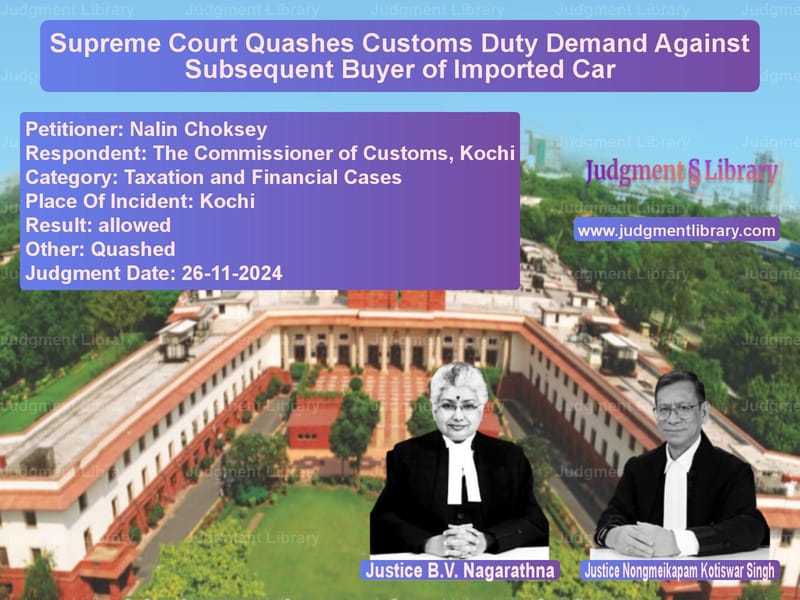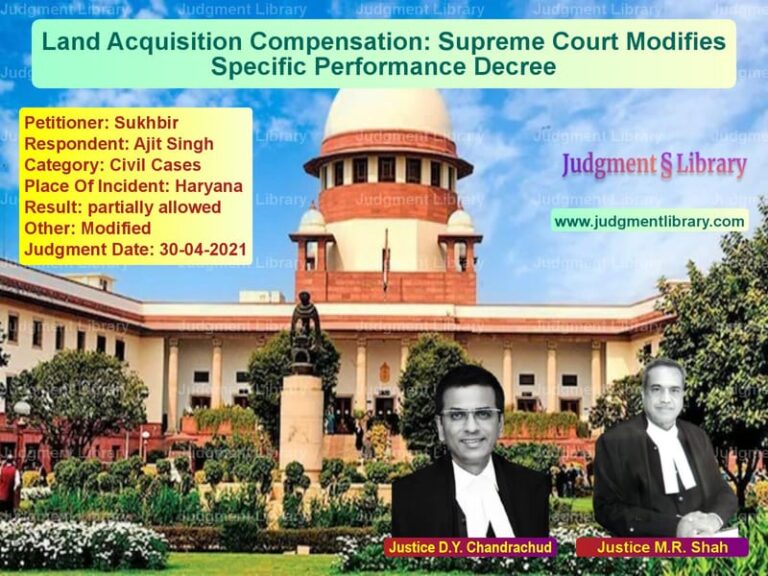Supreme Court Quashes Customs Duty Demand Against Subsequent Buyer of Imported Car
The case of Nalin Choksey vs. The Commissioner of Customs, Kochi has brought significant clarity to the issue of customs duty liability on subsequent purchasers of imported vehicles. The Supreme Court of India, in its judgment dated November 27, 2024, quashed the proceedings initiated against the appellant, holding that a subsequent buyer cannot be held responsible for customs duty shortfalls attributable to the original importer. This ruling has far-reaching implications for customs law, taxation, and the rights of bona fide purchasers.
Background of the Case
The controversy stemmed from the importation of a Porsche Carrera car on June 28, 2002, by one Sri Jalaludheen Kunhi Thayil. The vehicle was later sold to Sri Shailesh Kumar in 2003 and subsequently purchased by the appellant, Nalin Choksey, in October 2004.
In 2007, the Customs Department issued a Show-Cause Notice alleging that the vehicle had been misdeclared regarding its model and year of manufacture. The customs authorities claimed that this misdeclaration led to under-invoicing and evasion of customs duty amounting to Rs. 17,92,847. The notice was issued under Section 28(1) read with Section 124 of the Customs Act, 1962.
Chronology of Legal Proceedings
- 2007: The Customs Department issues a Show-Cause Notice to the importer, the first owner, the appellant (subsequent buyer), and a broker, alleging customs duty evasion.
- January 29, 2008: The Commissioner of Customs, Cochin, confirms the customs duty demand and orders confiscation of the vehicle with an option for redemption upon payment of the duty.
- September 23, 2008: The Customs, Excise, and Service Tax Appellate Tribunal (CESTAT), South Zonal Bench, Bangalore, rules in favor of the appellant, holding that he was a bona fide purchaser and had no role in the importation or misdeclaration.
- April 3, 2018: The Kerala High Court overturns the Tribunal’s decision, ruling that under Section 125 of the Customs Act, payment of short-levied duty is a necessary consequence of redemption of the goods.
- November 27, 2024: The Supreme Court quashes the proceedings against the appellant, holding that he was not liable for customs duty as a subsequent buyer.
Petitioner’s Arguments
Learned counsel for the appellant, Sri Shashibhushan P. Adgaonkar, put forth the following arguments:
- The appellant was not the importer of the car but merely a subsequent purchaser who had no involvement in the import process.
- Under Section 28 of the Customs Act, 1962, the liability to pay customs duty falls on the importer and not on subsequent purchasers.
- The car was legally purchased by the appellant in good faith, and there was no fraudulent intent on his part.
- The customs authorities had incorrectly assumed that the appellant was liable merely because the car was in his possession.
- The Motor Vehicles Act, 1988, defines ‘owner’ as the person in whose name the vehicle is registered. Since the registration remained in the name of the original importer, the appellant was not the legal owner.
Respondent’s Arguments
Learned senior counsel for the respondent, Sri Rupesh Kumar, representing the Customs Department, countered with the following points:
- The vehicle was seized from the possession of the appellant, and therefore, he was liable to pay the customs duty under Section 125 of the Customs Act.
- While the appellant was not the original importer, he had the option to redeem the confiscated vehicle and, as such, was required to pay the short-levied duty.
- The definition of ‘importer’ under Section 2(26) of the Customs Act includes a beneficial owner, and since the appellant had purchased the vehicle, he could be treated as the beneficial owner.
- The High Court had correctly ruled that under Section 125 of the Customs Act, once the appellant exercised the option to redeem the goods, he was liable to pay the customs duty.
Supreme Court’s Observations
The Supreme Court examined the legal framework governing the case, focusing on the Customs Act, 1962, and the Motor Vehicles Act, 1988. The key findings of the Court were as follows:
1. Definition of ‘Importer’
The Court analyzed the definition of ‘importer’ under Section 2(26) of the Customs Act, which states:
“‘Importer’, in relation to any goods at any time between their importation and the time when they are cleared for home consumption, includes any owner, beneficial owner, or any person holding himself out to be the importer.”
The Court held that this definition applied only to persons involved in the importation process. Since the appellant was not the importer or beneficial owner at the time of importation, he could not be held liable for customs duty.
2. Applicability of Section 125 of the Customs Act
The Supreme Court clarified that Section 125 of the Customs Act applies to the owner or the person from whose custody the goods were seized. However, the Court noted that the appellant was not the registered owner under the Motor Vehicles Act, and the original importer remained the legal owner.
3. Motor Vehicles Act, 1988
The Court further examined the Motor Vehicles Act and observed that:
- Section 2(30) defines ‘owner’ as the person in whose name the vehicle is registered.
- Since the registration remained in the name of the original importer, the appellant was not the legal owner.
- Customs authorities had incorrectly assumed that possession alone was sufficient to impose customs duty liability.
Supreme Court’s Judgment
The Supreme Court held that the proceedings initiated against the appellant were unlawful. The judgment concluded:
- The Customs Department had no legal basis to demand customs duty from a subsequent purchaser who was not involved in the importation process.
- The appellant’s possession of the car did not automatically make him liable under Section 125 of the Customs Act.
- The proceedings initiated against the appellant, including the Show-Cause Notice, were quashed.
- The order of the Customs, Excise, and Service Tax Appellate Tribunal (CESTAT) in favor of the appellant was restored.
- The customs authorities were free to proceed against the original importer to recover the customs duty.
Conclusion
This ruling has set a significant precedent in customs law, emphasizing that liability for customs duty rests solely with the importer and not with bona fide subsequent purchasers. The judgment reaffirms that possession alone does not equate to ownership under customs law and that authorities must strictly adhere to statutory definitions when imposing tax liabilities.
Petitioner Name: Nalin Choksey.Respondent Name: The Commissioner of Customs, Kochi.Judgment By: Justice B.V. Nagarathna, Justice Nongmeikapam Kotiswar Singh.Place Of Incident: Kochi.Judgment Date: 26-11-2024.
Don’t miss out on the full details! Download the complete judgment in PDF format below and gain valuable insights instantly!
Download Judgment: nalin-choksey-vs-the-commissioner-of-supreme-court-of-india-judgment-dated-26-11-2024.pdf
Directly Download Judgment: Directly download this Judgment
See all petitions in Customs and Excise
See all petitions in Tax Refund Disputes
See all petitions in Banking Regulations
See all petitions in Judgment by B.V. Nagarathna
See all petitions in Judgment by N. Kotiswar Singh
See all petitions in allowed
See all petitions in Quashed
See all petitions in supreme court of India judgments November 2024
See all petitions in 2024 judgments
See all posts in Taxation and Financial Cases Category
See all allowed petitions in Taxation and Financial Cases Category
See all Dismissed petitions in Taxation and Financial Cases Category
See all partially allowed petitions in Taxation and Financial Cases Category







